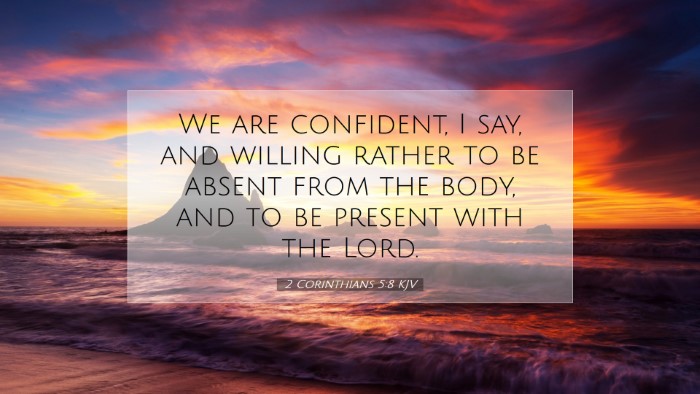Commentary on 2 Corinthians 5:8
Verse: "We are confident, I say, and willing rather to be absent from the body, and to be present with the Lord." (2 Corinthians 5:8)
Introduction
This verse encapsulates Paul’s heartfelt longing for the heavenly state and represents a profound theological perspective on life, death, and the believer's hope in Christ. In this commentary, we draw insights from several esteemed public domain commentaries, which highlight the depth and richness of Paul’s message to the Corinthian church.
The Context of 2 Corinthians
The Apostle Paul wrote 2 Corinthians as a defense of his ministry and an encouragement to the believers in Corinth. The backdrop of suffering and spiritual warfare frames much of his discourse here. Understanding this context is crucial to grasping the intensity and urgency of his words in chapter five.
Physical vs. Spiritual Existence
In this chapter, Paul contrasts the temporal nature of the physical body with the eternal nature of the spiritual existence. The natural body, though it provides us with life on earth, is subject to decay and death. Paul expresses a profound desire for the believers to recognize the impermanence of their earthly life and to yearn for the eternal life promised in Christ.
The Assurance of Confidence
Paul begins with a declaration of confidence concerning his spiritual journey. The term confident signifies a strong conviction that transcends mere hope. This confidence stems from the promises of God and the assurances given through Christ's resurrection. Paul aims to instill a similar confidence in the believers of Corinth, encouraging them to look beyond the current trials.
Insights from Matthew Henry
Matthew Henry elaborates on Paul’s confident assertion, emphasizing that this boldness reflects a thorough assurance in God’s promises. He writes, "The life of a believer is a perpetual warfare, and while here, they have to fight against a variety of enemies." This struggle instills a deeper appreciation for the ultimate reward awaiting them in heaven. Henry’s commentary also notes that the believer’s expectation of being with the Lord fosters a sense of purpose and direction during their earthly existence.
Insights from Albert Barnes
Albert Barnes provides a meticulous examination of the phrase "absent from the body." He posits that this indicates a transition from physical existence on earth to a new existence in the heavenly realm. Barnes emphasizes that the Apostle is advocating for a mindset that favors the eternal over the temporal. He further points out that spiritual existence with the Lord is the ultimate goal of the believer’s faith, where communion with God is realized in full.
Insights from Adam Clarke
Adam Clarke adds depth to this understanding by exploring the idea of being "present with the Lord." He explains that this presence is not merely a location but rather an intimate fellowship with God. Clarke articulates this state as one of profound joy and fulfillment—a contrast to the struggles and limitations encountered in the earthly life. He encourages believers to fix their eyes on this ultimate destination, which promises Perfection and eternal joy.
Theological Implications
The implications of 2 Corinthians 5:8 extend into various areas of Christian doctrine, particularly in eschatology, anthropology, and soteriology. It provides a framework for understanding the nature of man as both physical and spiritual, the hope of resurrection, and the eternal life that awaits those who are in Christ.
Eschatological Hope
Paul's assertion paves the way for discussions on eschatology, particularly concerning the intermediate state of believers. The verse implies that there exists a conscious existence beyond physical death, where the souls of believers are in the presence of Christ, a core belief supported by other biblical texts (e.g., Philippians 1:21-23).
Anthropological Considerations
In the framework of anthropology, the distinction between the body and the spirit emphasizes the dual nature of human beings. Understanding this dualism is critical for believers as it underscores the value of the spiritual over the physical, which resonates with Paul's overall teaching that the physical body will one day be transformed (1 Corinthians 15:51-53).
Soteriological Reflection
Finally, in terms of soteriology, Paul’s confidence in being with the Lord is firmly grounded in the redemptive work of Jesus Christ. It signifies the assurance that salvation secures believers a place in God's presence, fostering a relational aspect that surpasses mere existence.
Conclusion
2 Corinthians 5:8 presents a powerful testament to the believer’s hope in the face of mortality. Through insights gleaned from the commentaries of Matthew Henry, Albert Barnes, and Adam Clarke, we recognize the richness of Paul's words as they speak to the confident expectation that believers have in eternal life and the transformative presence of God. The verse encourages pastors, students, and theologians alike to foster a mindset that prioritizes spiritual realities over earthly trials. Embracing this hope not only strengthens faith but also informs living in a manner that reflects eternal values, guided by the promise of being with the Lord.


